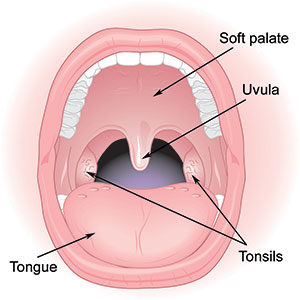Tonsillectomy
Procedures
Tonsillectomy
The tonsils are two clumps of tissue which are part of the immune system, that sit on either side of the back of the throat. Both adults and children can get tonsillitis which is an inflammation of the tonsils usually caused by infection. Sometimes an adenoidectomy is done at the same time to remove the adenoid from the back of the nose.
Tonsillectomy is an operation to remove the tonsils. The operation takes about 45mins and is done under General Anaesthetic.
Surgery may be considered for patients who get recurrent or long-lasting tonsillitis but also if the patient has snoring, obstructed breathing or pauses in breathing during sleep.

How do I know if tonsils are causing a problem for me or my child?
Patients will always wake up with a very sore throat. Ear ache is also common following tonsillectomy and is due to referred pain via nerves. Taste may be altered for several weeks.
Patients may be allowed to go home 4-6 hours after surgery. Before discharge patients must be able to drink freely and preferably eat soft food.
Typical full recovery may take up to two weeks and time off school or work should be anticipated for this period.
Drinking and Eating
Drink plenty of fluids after the operation; children may need to be encouraged with this. Try to avoid acidic and fizzy drinks as well as hot drinks as these will sting. Fluids will help ease the sore throat making swallowing easier and preventing dehydration. You may find ice blocks helpful. Try normal food from day 1 even if it is a small amount.
Pain relief
You will be given a prescription for pain relief before you leave the hospital. You may need pain relief for between 10 days and 2 weeks. It is important to take the pain medication regularly in the first week. It is sensible to set an alarm in the night to take additional medication in the first week. Do not take Aspirin or medications containing aspirin as this may increase the risk of bleeding after surgery. Pain is often worst on day 3 to 5 after the operation. Sugar free chewing gum sometimes helps.
Bleeding
There is a slight risk of bleeding in the first two weeks after surgery.. It usually starts as spitting or coughing up some blood, if this occurs suck on some ice immediately. If it does not stop after 5 min or if the bleeding is brisk call your surgeon immediately or go to the nearest Emergency Department. In an emergency call 111 for an ambulance.
Rest
You may feel tired for the next 1- 2 weeks, so it is important to rest. Avoid sports and swimming for at least 2-3 weeks to reduce the risk of bleeding. Your surgeon will advise you when you can return to daycare, school, or work. It is usually 10-14 days after surgery.
If you have any concerns after your procedure, please contact the following:
Tonsillectomy is an operation to remove the tonsils. The operation takes about 45mins and is done under General Anaesthetic.
Surgery may be considered for patients who get recurrent or long-lasting tonsillitis but also if the patient has snoring, obstructed breathing or pauses in breathing during sleep.

How do I know if tonsils are causing a problem for me or my child?
- Causes narrowing of the airway – making it difficult to sleep
- Causes snoring, which can be a sign of obstructive sleep apnoea
- Repeated throat infections
- Difficulty eating and swallowing
Patients will always wake up with a very sore throat. Ear ache is also common following tonsillectomy and is due to referred pain via nerves. Taste may be altered for several weeks.
Patients may be allowed to go home 4-6 hours after surgery. Before discharge patients must be able to drink freely and preferably eat soft food.
Typical full recovery may take up to two weeks and time off school or work should be anticipated for this period.
Drinking and Eating
Drink plenty of fluids after the operation; children may need to be encouraged with this. Try to avoid acidic and fizzy drinks as well as hot drinks as these will sting. Fluids will help ease the sore throat making swallowing easier and preventing dehydration. You may find ice blocks helpful. Try normal food from day 1 even if it is a small amount.
Pain relief
You will be given a prescription for pain relief before you leave the hospital. You may need pain relief for between 10 days and 2 weeks. It is important to take the pain medication regularly in the first week. It is sensible to set an alarm in the night to take additional medication in the first week. Do not take Aspirin or medications containing aspirin as this may increase the risk of bleeding after surgery. Pain is often worst on day 3 to 5 after the operation. Sugar free chewing gum sometimes helps.
Bleeding
There is a slight risk of bleeding in the first two weeks after surgery.. It usually starts as spitting or coughing up some blood, if this occurs suck on some ice immediately. If it does not stop after 5 min or if the bleeding is brisk call your surgeon immediately or go to the nearest Emergency Department. In an emergency call 111 for an ambulance.
Rest
You may feel tired for the next 1- 2 weeks, so it is important to rest. Avoid sports and swimming for at least 2-3 weeks to reduce the risk of bleeding. Your surgeon will advise you when you can return to daycare, school, or work. It is usually 10-14 days after surgery.
If you have any concerns after your procedure, please contact the following:
- Auckland ENT Group on 09 522 2226
- Your Family Doctor / GP
- After hours – 24 Hour Medical Centre or Emergency Department
- In case of an emergency – dial 111 for an ambulance.

